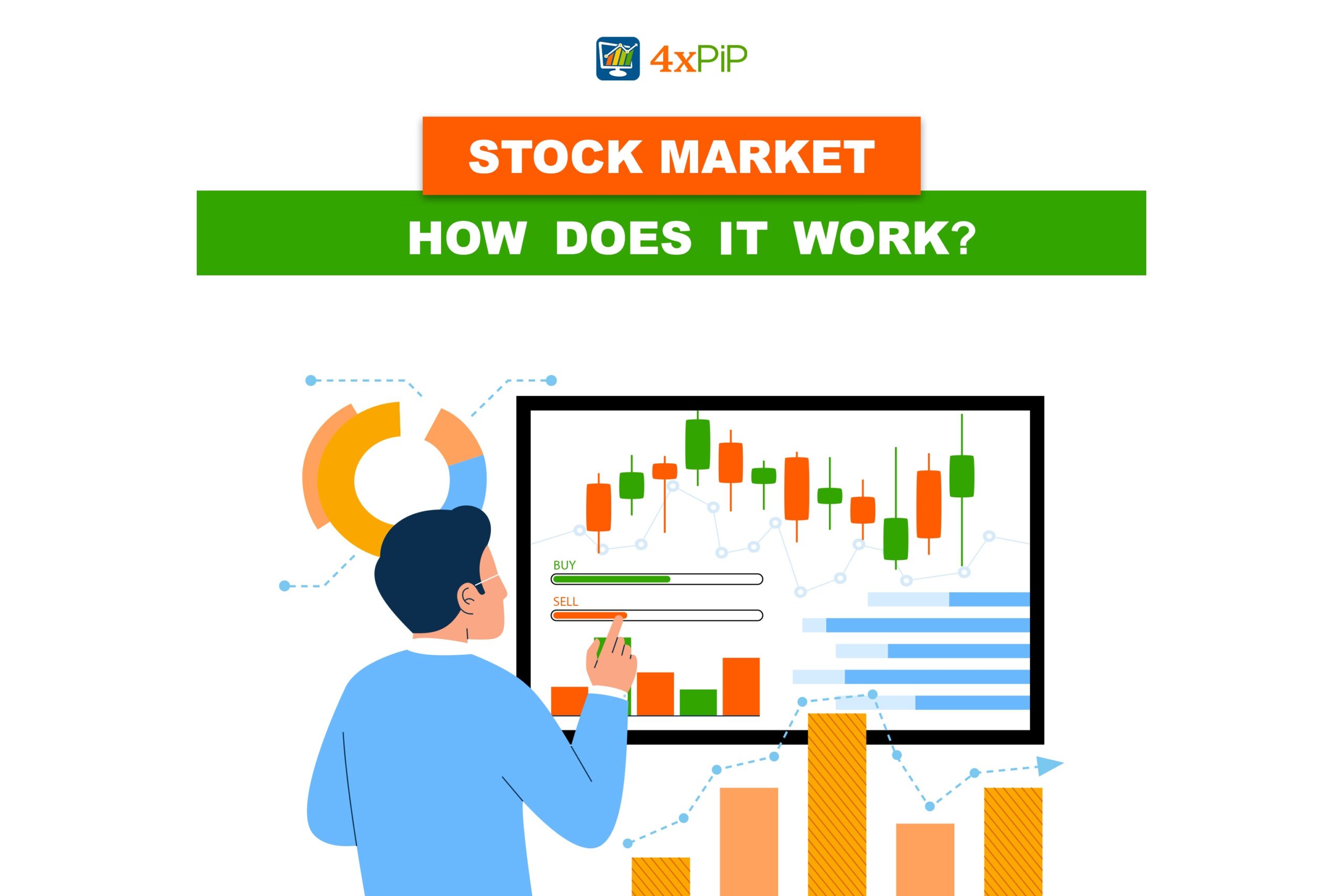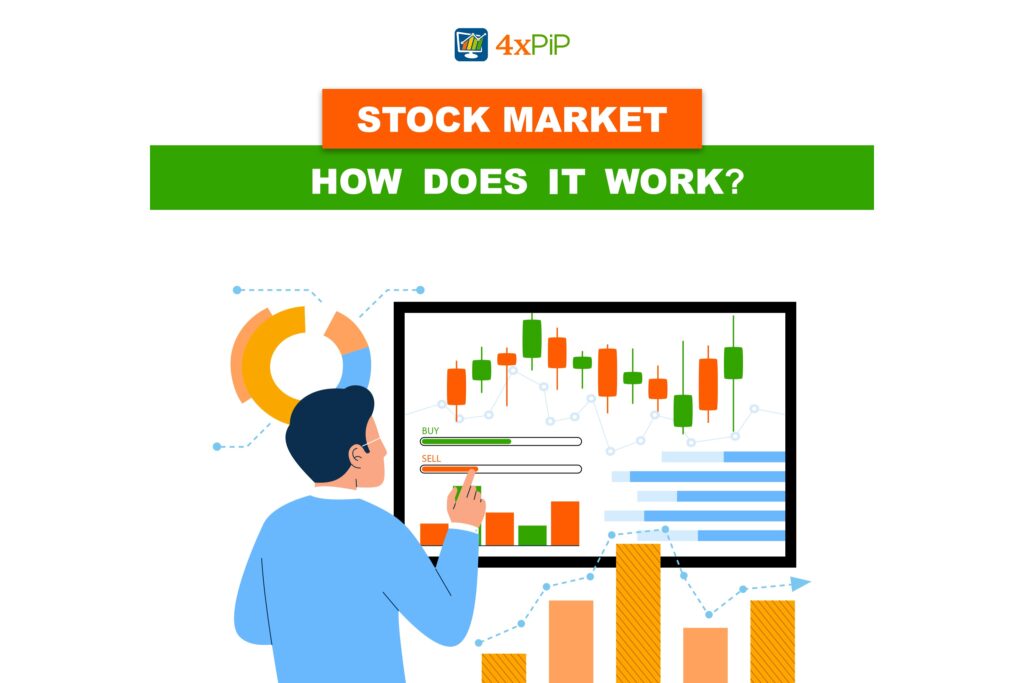In this article, 4xPip is going to provide you with some deep knowledge about the stock market and its working. The stock market isn’t as complicated as it might seem. It’s like a giant marketplace where people buy and sell pieces of companies. When you own a share of a company’s stock, you own a small part of that company. Let’s break down what the stock market is and how it works, especially if you’re new to all this. Remember there are so many stock markets; New York, Shanghai, Tokyo, Shenzhen, and London. But the most important is the New York Stock Exchange where all Billion $$ companies are registered and traded trillions of $$ every day.
What Exactly is The Stock Market?
Think of the stock market as a place where you can buy and sell ownership in companies. These ownership pieces are called “stocks“. Stocks are also called shares or equity. People often refer to the stock market as a big market where stocks are traded.
There are two types of stocks; common shares and preferred shares.
Common shareholders have the right to vote on company matters, while preferred shareholders do not. Preferred shareholders have a higher claim on dividends and assets than common shareholders in the event of company liquidation.
Some of the most famous stock markets in the United States are the New York Stock Exchange (NYSE) and the Nasdaq.
So, when you hear “stock market” or “stock exchange“, they’re often talking about the same thing. People who want to buy or sell shares of companies do it on these stock exchanges. It’s like buying and selling items in a store, but instead of items, they’re trading pieces of companies.
These are part of a free-market system because they let anyone participate in trading and raising money. The U.S. stock market follows rules from the Securities and Exchange Commission (SEC) and local regulators. For a detailed discussion of stock market and its regulations, kindly contact 4xPip Customer Support at [email protected]
How Does the Stock Market Work?
The stock market helps us figure out how much the shares are worth and gives us an idea of how the whole economy is doing. In the stock market, everyone plays fair, and it’s easy to buy and sell things quickly because it’s open and clear for everyone. Also, stock markets offer a safe and well-regulated place for people to buy and sell company shares and other financial stuff without worrying too much about problems.
They follow specific rules set by the government and serve two main purposes: the primary market and the secondary market.
In the primary market, companies can sell their shares to the public for the first time, usually through something called an IPO. It’s like a company saying, “Hey, we’re selling parts of our business to people, and we need their money.” This helps companies get the money they need. Sometimes, a company might want to sell more shares later on, or they might want to buy back some of the shares they sold.
Shareholders own a portion of a company and have the right to vote on corporate decisions, as well as share in the company’s profits through capital gains and dividends.
People and companies buy and sell pieces of companies on stock markets, which are open to everyone. When you buy a stock on the stock market, you are buying it from someone else who already owns it, not from the company itself. When you sell a stock, you are selling it to someone else, not back to the company. This is known as the secondary market.
Investors buy these company shares, hoping they’ll become worth more over time, or they might get some money back as dividends. The stock market helps with this whole process and gets paid by the company and its partners for doing so.
Moreover, stock markets also keep track of how well the whole market is doing. They have special numbers, like the S&P 500 or Nasdaq 100, that tell us if the market is going up or down.
Functions & Regulations of the Stock Market:
The stock market is like a fair playing field where everyone can see the prices, easily buy or sell, and ensure they get a good deal. It’s all about making sure that people who want to buy or sell can do it quickly and at the right price. This is important because the price of a stock should be decided by everyone who wants to buy or sell it.
In the stock market, there are different kinds of people, like investors who buy stocks to keep for a long time, and traders who buy and sell quickly. Some folks, called market makers, help keep things running smoothly by providing enough stuff to buy or sell. Others, known as hedgers, deal in special agreements to protect themselves from risks.
In most countries, there’s a stock market, and it’s watched over by a local financial regulator or authority. In the United States, the SEC (Securities and Exchange Commission) takes care of this job.
The SEC is a special government agency, and it works independently without any political influence. Its main job is to protect people who invest in the stock market, make sure the market is fair and organized, and help companies get the money they need to grow.
Publicly traded companies must adhere to regulations, and the SEC closely monitors their activities. Stock exchanges also have their own standards, such as requiring companies to release their financial results promptly and share significant information promptly. If companies fail to comply with these regulations, they may face penalties, such as a trading halt.
Significance: The stock market is a vital part of the free market economy. It allows companies to raise capital and investors to participate in the success of businesses, which drives economic growth.
Who are Stockbrokers?
Stockbrokers buy and sell stocks on behalf of investors, while portfolio managers invest portfolios of securities for their clients. Investment bankers advise and represent companies on a variety of financial matters, including initial public offerings (IPOs) and mergers and acquisitions (M&A).
What Are Stock Market Indexes?
Market indices are popular measures of stock market performance. Most indices are market-cap weighted, meaning that the weight of each constituent stock is proportional to its market capitalization. This means that the largest companies have the greatest influence on the index’s performance.
The Dow Jones Industrial Average (DJIA) is a price-weighted index, meaning that the weight of each constituent stock is proportional to its price. This means that the stocks with the highest prices have the greatest influence on the index’s performance.
The S&P 500 is a market-cap-weighted index of the 500 largest companies in the US. This makes it a more representative indicator of the overall US stock market than the DJIA.
Indices can be broad, such as the DJIA or S&P 500, or they can be specific to a certain industry or market sector. Investors can trade indices indirectly via futures markets, or via exchange-traded funds (ETFs), which act just like stocks on stock exchanges.
If you are going to start auto-trading on stock market indexes, then look no further. 4xPip provides all kinds of auto-trading bots including Trade Manager, high-performing EAs, News Robots, and Risk management utilities.
Self-Regulatory Organizations (SROs):
SROs are non-governmental organizations that have the power to create and enforce industry regulations and standards for stock exchanges. The primary goal of SROs is to protect investors by establishing rules that promote ethics and equality.
Examples of SROs in the US include individual stock exchanges, as well as the National Association of Securities Dealers (NASD) and the Financial Industry Regulatory Authority (FINRA).
How Share Prices Are Set?
SThe continuous auction process determines stock prices as buyers and sellers submit bids and offers to buy or sell shares, with a trade executing when a buyer’s bid matches a seller’s offer.
Supply and Demand | Stock Market:
The stock market is a real-time example of supply and demand in action. For every stock trade, there must be a buyer and a seller. If there are more buyers than sellers, the stock price will tend to rise. Conversely, if there are more sellers than buyers, the price will tend to fall.
The bid-ask spread is the difference between the highest price that a buyer is willing to pay for a stock and the lowest price that a seller is willing to accept. It represents the cost of buying or selling a stock.
A trade occurs when a buyer accepts the asking price or a seller accepts the bid price. If there are more buyers than sellers, buyers may be willing to pay higher prices to acquire the stock. This will encourage sellers to raise their asking prices, which will drive the price up. Conversely, if there are more sellers than buyers, sellers may be willing to accept lower prices. This will encourage buyers to lower their bids, which will drive the price down.
OTC Market
OTC or Over-The-Counter markets are less regulated than traditional stock exchanges, and they often list companies that do not meet the stricter listing requirements of larger exchanges. This means that OTC stocks can be riskier than stocks listed on traditional exchanges.
Advantages and Disadvantages of the Stock Market:
An exchange listing provides companies with access to liquidity, capital, talent, visibility, and acquisition currency. This means that companies can easily sell their shares to investors, raise additional funds, attract talented employees, and increase their visibility in the marketplace.Overall, an exchange listing can provide companies with a number of advantages that can help them to grow and succeed.
Exchange listings can be costly, with high listing fees and compliance costs. Additionally, burdensome regulations can restrict a company’s ability to operate. Finally, the short-term focus of many investors can pressure companies to focus on quarterly earnings at the expense of long-term strategy.
Investments in Stocks
Stocks have historically been the best investment over the long term. They generate returns from capital gains and dividends. Capital gains happen when you sell a stock for more than you paid for it. Dividends are payments that companies make to their shareholders. Some investors take risks to try to make big profits from capital gains. Others prefer to invest in stocks that pay high dividends. It is important to choose investments that match your risk tolerance and investment goals.
Can people lose money in the stock market?
Yes, people can lose money in the stock market. This is especially true for investors who make risky investments or who sell their stocks during a market crash. Margin trading can also magnify losses, making the stock market even riskier.
Here are some tips to help you avoid losing money in the stock market:
-
- Invest in a diversified portfolio of stocks, including both growth and value stocks.
-
- Do your research before investing in any stock.
-
- Don’t invest more money than you can afford to lose.
-
- Be patient and don’t sell your stocks during a market crash.
If you are new to investing, it is a good idea to consult with a financial advisor or an expert. 4xPip is the best financial advisor for stock market. They have regulated brokers, traders and even programmers.
Inflation and Stock Market
Inflation is when prices go up. This can happen because there is too much money in the economy or because there are not enough goods to buy. Inflation can affect the stock market in different ways. Sometimes, it can cause stock prices to go up because more people have money to invest. However, inflation can also hurt businesses because it makes it more expensive to produce goods and services. This can lead to lower profits for companies and lower stock prices.
Overall, value stocks tend to do better than growth stocks during times of high inflation. This is because value stocks are typically cheaper than growth stocks and are more likely to be profitable even when inflation is high.
Some Other Types of Trading
There are different financial markets, such as:
-
- Cryptos: Cryptocurrency markets are where people buy and sell digital or virtual tokens that use cryptography to secure their transactions and to control the creation of new units.
-
- Indices: Stock market indices are a collection of stocks that are grouped together based on a set of criteria, such as market capitalization, industry, or sector.
-
- Commodities: Commodity markets are where people buy and sell raw materials, such as oil, gold, and wheat.
-
- Metals: Precious metals markets are where people buy and sell gold, silver, platinum, and palladium.
-
- Forex: The foreign exchange market, also known as forex or FX, is a decentralized global market where all the world’s currencies are traded.
Financial markets are important because they allow people to invest their money and trade assets. They also provide a way for businesses to raise capital and hedge against risk.
Conclusion:
The stock market is a place where people can buy and sell shares of companies. It is a vital part of the economy, allowing companies to raise money and investors to participate in the success of businesses. There are two types of stocks: common and preferred. Common shareholders have the right to vote on company matters, while preferred shareholders do not. The SEC regulates the stock market to protect investors and ensure fairness. There are many different types of participants in the stock market, including investors, traders, market makers, and hedgers. Stock prices are determined through a continuous auction process, where buyers and sellers submit bids and offers. The stock market can be a great way to invest in the economy and grow your wealth over time, but it is important to understand the risks involved before investing.
Stocks are a good investment over the long term, but they can be risky. To avoid losing money, choose investments that match your risk tolerance and investment goals. Invest in a diversified portfolio of stocks, do your research, and don’t invest more than you can afford to lose. Inflation can affect the stock market in different ways, but value stocks tend to do better than growth stocks during times of high inflation.





